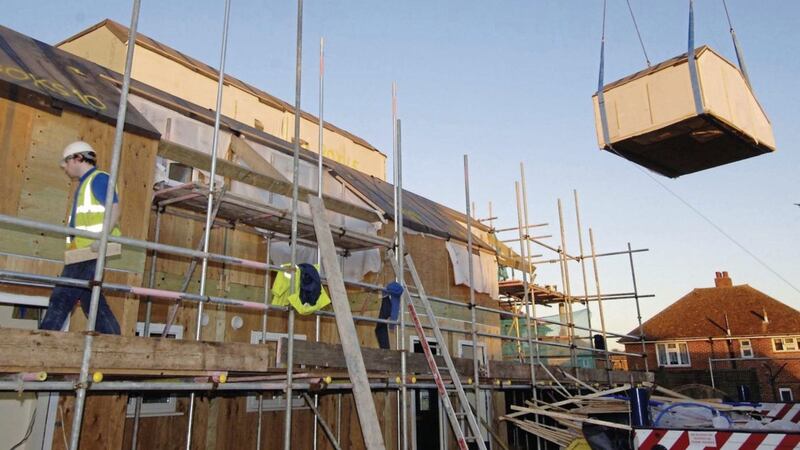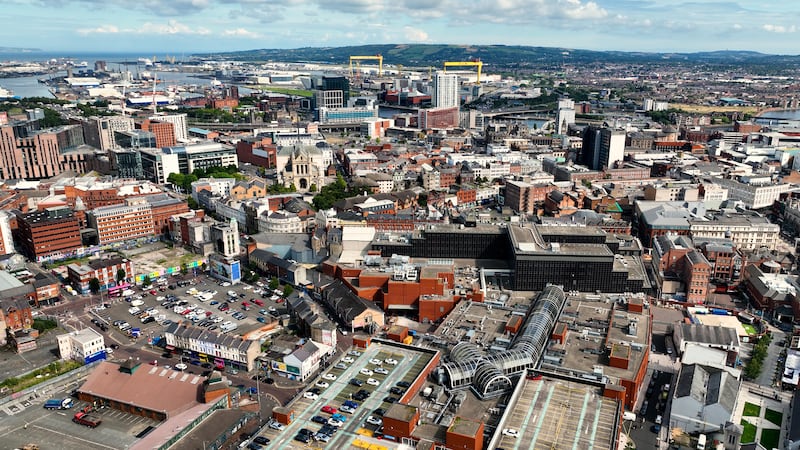SURVEYORS in Northern Ireland remain the least optimistic in the UK about hiring new staff over the next year as a new study reveals that local construction activity continued to fall amidst a lack of publicly-funded building work.
The survey, carried out by the Royal Institution of Chartered Surveyors (RICS) and Belfast law firm Tughans, found that the north's construction industry is still lagging behind other UK regions.
The findings, however, fly in the face of a separate barometer from the Federation of Master Builders (FMB) yesterday, which found that the pace of growth among small building firms in Northern Ireland quickened in the first three months of this year.
The RICS/Tughan’s study found that Northern Ireland was one of only two UK regions where the balance of surveyors reported an overall decline in workloads in the January to March quarter.
But one bright spot is private sector house building, where workloads appear to be rising at a rate above the UK average.
Comments from surveyors suggest that the current political landscape, with no local administration operating and Brexit uncertainties, have contributed to the present malaise.
Public housing, public non-housing and infrastructure all continued to see declines in activity, as did commercial construction.
On a more positive note, at the end of 2018 the 12-month outlook in terms of workloads was flat but this has risen to a more positive level, albeit below the UK average.
On the other hand, Northern Ireland is the least optimistic in terms of 12-month forecasts for employment prospects and profit margins.
Jim Sammon, RICS' regional construction spokesman, said: “House building remains the positive story, but the local construction sector continues to be faced with an unsettling overall picture, particularly regarding public-funded work.
“Northern Ireland continues to feel the effects of the challenging political circumstances, and whilst te imminent threat of a no-deal Brexit has clearly receded, investors appear to be continuing to proceed with some caution,” he adds.
David Jones, head of real estate at Tughans, added: “The challenging and much publicised retail landscape is no doubt reflected in the drop in private commercial activity, and it is no surprise that the political situation continues to be felt regarding work that is dependent on public funding.”
“Private house-building, on the other hand, continues to be an area of real strength in the market with the demand for new build properties. But those in the sector will be hoping for more widespread growth in the quarters ahead, and to see more decisions being made around public investment in infrastructure and other projects.”
The key headline Northern Ireland findings of the latest survey are as follows (all figures are the net balance of respondents):
• The headline workloads/activity net balance for Q1 was minus-6 per cent (meaning that 6 per cent more respondents reported falls in workloads in Q1 2019 than reported rises);
• Public non-housing activity saw a decline according to a net balance of minus-44 per cent of respondents, while a net balance of minus-11 per cent also reported a drop in private commercial activity (after a rise in Q4 2018);
• Infrastructure activity remains in negative territory according to a net balance of minus-13 per cent of respondents;
• Public housing workloads and private industrial activity also are suffering according to a net balance of minus-14 per cent of respondents in each instance;
• However, a net balance of 19 per cent of respondents reported a further increase in private housing workloads;
• Looking forward, Northern Ireland surveyors remain the least optimistic in the UK with regards to employment over the next 12 months, with a balance of plus-5 per cent saying they expect to take on new staff in comparison to a UK average of 17 per cent;
• Forecasts of year ahead workloads are also the lowest in the UK despite an increase in the past quarter, showing a balance of 16 per cent compared to an average of 28 per cent for the UK;
• NI respondents therefore expect to see profits remain in negative territory in the year, with a net balance of minus-17 per cent.








